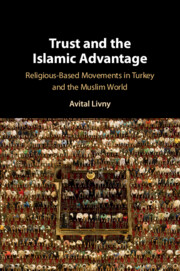Crossref Citations
This Book has been
cited by the following publications. This list is generated based on data provided by Crossref.
Cansunar, Asli
and
Kuran, Timur
2019.
Economic Harbingers of Political Modernization: Peaceful Explosion of Rights in Ottoman Istanbul.
SSRN Electronic Journal ,
Koyama, Mark
2020.
The Institutional Foundations of Religious Freedom.
Journal of Economics, Management and Religion,
Vol. 01,
Issue. 02,
p.
2050006.
Svolik, Milan
2021.
Voting \emph{Against} Autocracy.
SSRN Electronic Journal ,
Chakrabarti, Poulomi
Cammett, Melani
and
Romney, David
2021.
Social Accountability and Minority Status: Contributions to Public Goods by Hindus and Muslims in Delhi Slums.
SSRN Electronic Journal ,
Baykan, Toygar Sinan
and
Somer, Murat
2022.
Politics of Notables versus National Machine: Social, Political and State Transformations, Party Organizations and Clientelism during AKP Governments.
European journal of Turkish studies,
Corstange, Daniel
2022.
Religiosity Inside and Outside the Muslim World.
Political Psychology,
Vol. 43,
Issue. S1,
p.
221.
Aksoy, Ozan
and
Gambetta, Diego
2022.
Commitment through Sacrifice: How Longer Ramadan Fasting Strengthens Religiosity and Political Islam.
American Sociological Review,
Vol. 87,
Issue. 4,
p.
555.
Djupe, Paul A.
and
Neiheisel, Jacob R.
2022.
The Religious Communication Approach and Political Behavior.
Political Psychology,
Vol. 43,
Issue. S1,
p.
165.
Overos, Henry David
and
Sauer, Jeffery
2023.
Dieu dans la commune: religion and voting in the 2017 French election.
Politics and Religion,
Vol. 16,
Issue. 4,
p.
605.
Williamson, Scott
Yildirim, A. Kadir
Grewal, Sharan
and
Kuenkler, Mirjam
2023.
Preaching Politics: How Politicization Undermines Religious Authority in the Middle East.
British Journal of Political Science,
Vol. 53,
Issue. 2,
p.
555.
2023.
Politics in the Crevices.
p.
1.
Aksoy, Deniz
Menger, Andrew
and
Tavits, Margit
2023.
The Effect of Curfews on Political Preferences.
Journal of Conflict Resolution,
Vol. 67,
Issue. 1,
p.
94.
2023.
Politics in the Crevices.
p.
183.
2023.
Politics in the Crevices.
p.
217.
2023.
Politics in the Crevices.
p.
107.
2023.
Politics in the Crevices.
p.
65.
Kirdiş, Esen
2023.
Education, Media and Civil Society: The Building of an Islamic Cultural Hegemony in Turkey.
The International Spectator,
Vol. 58,
Issue. 1,
p.
146.
2023.
Politics in the Crevices.
p.
21.
2023.
Politics in the Crevices.
p.
148.
2023.
Politics in the Crevices.
p.
233.



